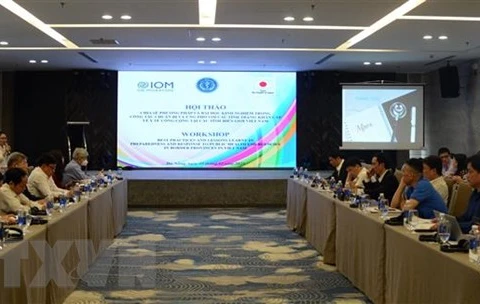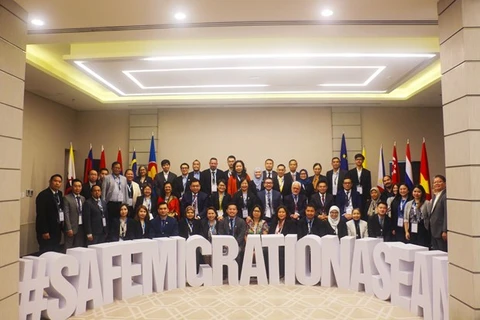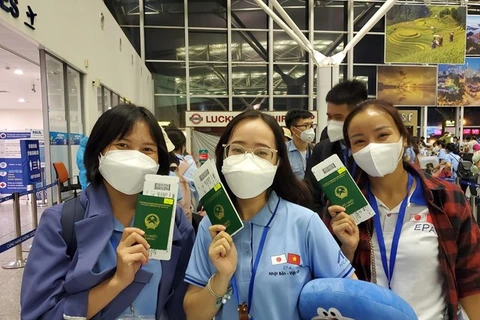 Deputy Director of the Vietnam Population Authority Hoang Thi Thom speaks at the ceremony. (Photo: VietnamPlus)
Deputy Director of the Vietnam Population Authority Hoang Thi Thom speaks at the ceremony. (Photo: VietnamPlus) Hanoi (VNA) – Migrants face challenges in accessing social services. They are among the most vulnerable groups, especially in emergency public health situations and with the impact of climate change.
These were discussed at a ceremony to celebrate International Migrants Day (December 12) held on December 9 by the Vietnam Population Authority, Migration Health Working Group (MHWG) and the International Organisation for Migration (IOM).
Speaking at the event, Deputy Director of the Vietnam Population Authority under the Ministry of Health Hoang Thi Thom said that Vietnam currently has a population of more than 100 million people, ranking 15th in the world, 8th in Asia and 3rd in ASEAN.
The country is in a period of golden population structure with 67.6 million people of working age.
With a population of 100 million people, Vietnam is an attractive market to many investors. The country is more attractive thanks to its prime geopolitical location, stable political environment, a large proportion of the population at working age, and hard-working people.
Vietnam is also a country of emigration, with Vietnamese citizens moving to many countries on the international migration map. Vietnamese migrants have been actively contributing to socioeconomic development, building the cultural community of host countries as well as making positive contributions to Vietnam’s economic development," Thom said.
Park Mihyung, IOM Chief of Mission in Vietnam said that about 5.3 million Vietnamese people have migrated and are living abroad.
To ensure that migrants can take advantage of their full potential, more dialogue and consultation between governments, international organisations, the technology sector, businesses, and law enforcement agencies are needed.
Phan Thi Minh Giang, Deputy Director of the Consular Department under the Ministry of Foreign Affairs, said according to the department’s data, more than 650,000 Vietnamese workers are working abroad under labour contracts. Nearly 200,000 students are studying abroad, not to mention other types of migration.
Migration activities of Vietnamese citizens have contributed to solving employment pressures, increasing income, reducing poverty, transferring knowledge, improving the quality of human resources, and creating motivation for local and national development.
Recognising the role of migration and migrants in the country's development, in recent times, Vietnam has made efforts to perfect policies and legal systems to strengthen migration management, promote legal, safe and orderly migration, and protect the legitimate rights and interests of migrants.
Particularly, Vietnam has been effectively implementing international commitments, including the Global Compact for Safe, Orderly and Regular Migration, Giang said.
In particular, Vietnam set up a Migration Health Working Group (MHWG), and developed and published a health handbook for migrant workers in Japan and the Republic of Korea, Giang said.
The ceremony was held to respond to the United Nations' call to recognise important contributions of migrants and then, join hands to support and protect migrants. On December 4 2000, the General Assembly, taking into account the large and increasing number of migrants in the world, proclaimed December 18 International Migrants Day. On that day, in 1990, the Assembly adopted the International Convention on the Protection of the Rights of All Migrant Workers and Members of Their Families./.

























